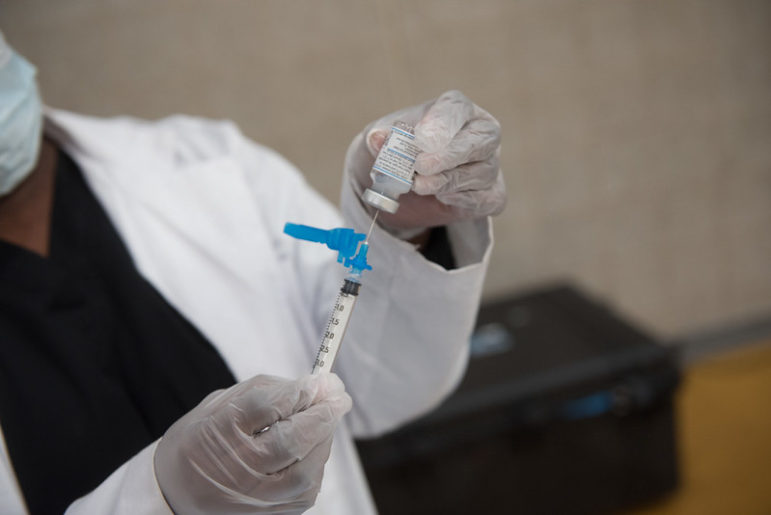So did healthcare, education, crimes against workers and transportation.

Michael Appleton/Mayoral Photography Office
Vaccination center at NYCHA Van Dyke Houses in Brownsville, Brooklyn on Tuesday, January 19, 2021.As of Monday, New York City is exactly three months out from the June 22 mayoral primary, with early voting even closer. In the past week, here are a few highlights of the policy conversation among candidates for mayor, comptroller and Manhattan district attorney:
Adams wants vaccination sites to morph into clinics
While he did publish a lengthy and broad list of ideas early in his campaign, Brooklyn Borough President Eric Adams has issued fewer fleshed-out policy proposals than any of his fellow major mayoral candidates. The healthcare policy he issued last week is still less detailed than most, but it addresses a key element of the health challenge in New York City: access to practitioners. Having insurance—which thanks to the federal Affordable Care Act, the state’s Child Health Plus program and the city’s NYC Care initiative, more people have than ever before—is not the same as having healthcare. Even before COVID-19, getting an appointment with a doctor was often very difficult, and getting to and from those appointments can be costly, difficult and time-consuming, creating real barriers. Adams is proposing using some of the federal stimulus money to open 100 additional vaccination sites—double the 100 that are already planned—in shuttered retail spaces. He wants to then keep those sites open for “a permanent healthcare community-based, street-level approach” that will pay off in healthier people, fewer hospitalizations and (though Adams didn’t say as much in his unveiling of the policy last week) jobs. The clinics would serve people regardless of immigration status.
A bold plan for open space
Mayoral candidate Maya Wiley’s climate-change policy, which like her other proposals is described as the outcome of a collaborative design process with community and advocacy organizations, is linked closely to economic equity and workforce development goals. She wants to “remove barriers to entry for communities of color to be owners, producers, distributors and generators of renewable energy and climate resiliency” and create a Green Future Force to dispatch young trainees for year-long apprenticeships in sustainability work. The detailed plan also lays out mechanisms for addressing asthma, improving coastal resiliency and reducing emissions from the commercial sector. One of the most ambitious elements is a vow to “double the city’s open and green space, including bike and bus lanes, open streets, parks, community gardens, and accessible waterfront areas.”
Stringer on schools
The next mayor will be sworn in as New York public school students are wrapping up their 2021-2022 winter break. It’s unclear whether COVID-19 will still be a major factor in their day-to-day educational experiences by then, but there’s no question that pandemic learning loss and longstanding deficiencies in the school system will still be in play. Mayor candidate Scott Stringer’s education plan would address those challenges with a combination of new resources and new policies, the headline idea being a promise to eventually place two teachers in every K-5 classroom. No price-tag is proposed: It would be steep, but it would allow more instruction “centered on the learning needs of an individual child” such as in literacy, where Stringer says schools must “provide explicit support in developing the tools of reading, including phonemic awareness, phonics, vocabulary, comprehension, and fluency.” Stringer would also add social workers to schools, make food on the city’s special-education responsibilities and expand and improve the city’s early childhood education and after-school programs. He also pledges to “make permanent changes to reduce or eliminate the use of academic screens at the middle school level [and] reduce the number of high schools that screen students,” to end the SHSAT test but base admission to the selective schools on the state tests that all seventh graders take.
Comptrolling the climate
Comptroller candidate Brian Benjamin’s climate-change policy revolves around two pillars of the comptroller’s office: its audit power and its role guiding the city’s pension investment. He’s vowing to add a three-part sustainability test (climate change, emergency preparedness, and innovation) to every audit the office does, engage in shareholder activism on behalf of a climate agenda, carefully choose green-economy investments for the pension funds and guide the three pension funds that have approved fossil-fuel divestment through unwinding their holdings; his plan is silent on whether he’ll push for the remaining two funds, the cops’ and firefighters’, to divest as well. Benjamin’s plan links climate activism to transportation improvements: For instance, he wants to track tax incentives and public benefits associated with electric-car charging stations. Like current comptroller Scott Stringer, Benjamin sees potential to use city-owned vacant land to host a combination of affordable housing and green infrastructure. Since mayoral candidate Stringer is planning to use that land primarily if not exclusively for housing, the two plans would need to be reconciled—but that’s not impossible to imagine: According to the de Blasio administration, many of those parcels are inappropriate for housing, anyway.
Comptrolling the subways
The city comptroller is twice removed from any operational or regulatory authority over the MTA: The transit system is not under city control and the comptroller’s office doesn’t make city policy anyhow. But comptroller candidate Brad Lander believes he could have a meaningful role in improving the subways and buses. In a plan released last week, Lander vows to use the financial acumen within the comptroller’s staff to “identify new sources of revenue for the MTA that do not require raising fares for riders” while expanding Fair Fares discounts to cover more New Yorkers. He also promises to use his bully pulpit to promote improvement of the subway system’s antiquated signal apparatus, returning the MTA to 24-hour service and improving the bus system. Lander’s plan says he will “hold the city accountable to its commitment to building dedicated bus lanes and transitioning to a zero-emission bus fleet by 2040.” A spokesperson says he’ll do this through a combination of press attention, research using the comptroller’s audit and subpoena power “plus the participatory/organizing approach to mobilize New Yorkers that Brad brings to all his work.” Lander’s MTA ideas are embedded within a larger transportation policy that also focuses on pedestrian safety, bike access and infrastructure.
A crackdown on corporations
Manhattan district attorney candidate Eliza Orlins last week issued an economic-crimes policy that echoed many of her rivals: It called, as many others have, for the creation of a “worker protection unit” within the DA’s office, and promised to go after landlords who violate the public trust. What was interesting about the plan was its vow to “investigate and prosecute corporations that abuse public investments to fraudulently increase their own profits.” The example Orlins cited was the investment over the past year of public funds in hospitals and healthcare companies. “As DA, I will ensure that public funding allocated to support healthcare needs truly helps people, not corporations,” she said. “My office will investigate any allegations of corporations misusing public funds, and prosecute any violations that we uncover, in areas including public transit, Health and Human Services, and more.” In a time of tight budgets and potential austerity measures, detecting waste could be a popular cause, although much of the government’s contracting budget is not spent via for-profit corporations but rather through nonprofits.
Outreach against Asian hate
Hate crimes are already more commonly reported in New York County than just about anywhere else in the state: According to the state Division of Criminal Justice Services, there were 132 hate crimes reported in Manhattan in 2019, second only to Brooklyn’s 184 and nearly twice what was recorded in far more populous Queens (68). But the rise in anti-Asian hate crimes in 2020 has DA hopeful Tali Farhadian Weinstein calling for more aggressive handling of hate crime cases, and more extensive efforts to detect such crimes. In addition to promising “she will ensure that hate crime reports are swiftly and thoroughly investigated,” Weinstein vows to pursue partnerships with community groups, hire Asian-community liaisons and translators and take “steps to correct the spread of misinformation and hate online against Asians.” Anti-Asian incidents already make up a large share of the city’s hate-crime arrests: NYPD data indicate that in calendar year 2020, 20 of the NYPD’s 93 hate crimes arrests involved anti-Asian activity; another 20 were anti-LGBTQ and 25 were anti-Jewish.










One thought on “Policy Shop: Hate Crimes and Climate Change Get Attention from Candidates”
I find environmental problems increasingly difficult to check today, especially the water environment (clean water, marine waste …) and they just give advice, advice… without any replacement. let’s change the move to protect the underwater environment (especially the underwater environment), if any, is not really strong and definitive.